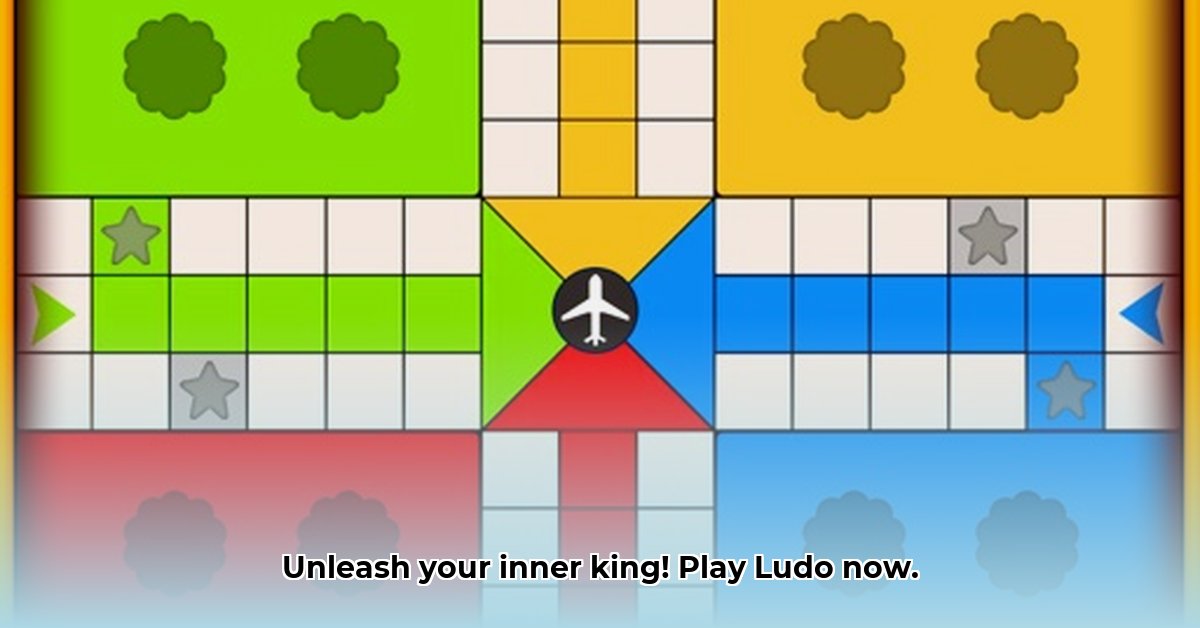
Ludo Offline Dice Board Game: A Medieval Roll of the Dice
Step back in time with Ludo Offline, a classic board game infused with a medieval theme. Forget plain pawns; command valiant knights in a quest to reach your castle first. This offline version retains the familiar Ludo mechanics: roll the dice, navigate the board, and outmaneuver opponents. The simple gameplay, enhanced by its elegant medieval design, offers a visually appealing and easily accessible experience for players of all ages. But how does this charming game fare in the fiercely competitive mobile gaming market?
The App Store Arena: Battling for Players' Attention
The mobile gaming landscape is saturated with countless apps vying for attention. Many Ludo games already exist; so what sets Ludo Offline apart? Its medieval theme offers a unique visual identity, differentiating it from more generic alternatives. More significantly, its offline capability is a considerable advantage, allowing players to enjoy the game regardless of internet connectivity. However, a comprehensive assessment of its market performance requires additional data. Crucial information, such as download rates, user reviews, and monetization strategies (ads, in-app purchases, or a hybrid model), remains unavailable. A deeper analysis is needed to definitively gauge its potential. How can we guarantee the game's success in such a crowded marketplace?
Key Data Gaps:
- User Acquisition: Precise download figures are needed to accurately assess the game's reach.
- User Retention: Understanding player engagement is crucial for predicting long-term success.
- Monetization Effectiveness: Detailed information about revenue generation is essential for evaluating its financial viability.
Charting a Course to Victory: Short-Term and Long-Term Strategies
To thrive in this competitive market, Ludo Offline needs a robust strategic plan. Here’s a breakdown of short-term and long-term goals:
Short-Term Goals (Within the Next Year):
- Prioritize Player Feedback: Actively solicit and analyze user reviews to identify areas for improvement and address player concerns. This iterative approach ensures player satisfaction.
- Boost Social Interaction: Implement features such as leaderboards and friend challenges to enhance engagement and competition. This increases user retention.
- Refine Monetization: Experiment with different monetization models (e.g., ads, in-app purchases) to optimize revenue generation while maintaining a positive user experience. A/B testing is key to finding the ideal balance.
- Competitive Analysis: Study successful Ludo games to identify best practices and differentiate Ludo Offline effectively. Learning from competitors is crucial for innovation.
Long-Term Vision (Over the Next 3-5 Years):
- Expand the Game Universe: Introduce new themes (e.g., pirates, sci-fi), game modes, and expansions to maintain player interest and attract new audiences. Diversification is essential for longevity.
- Platform Expansion: Explore opportunities to expand onto other platforms like iOS, PC, or consoles, thereby reaching a wider player base and maximizing market penetration.
- Data-Driven Development: Continuously monitor key performance indicators (KPIs) like player retention and engagement to inform data-driven development decisions. This ensures future growth.
- Strategic Partnerships: Collaborate with influencers and other game developers for cross-promotion and increased visibility. Strategic alliances expand reach and brand awareness.
The Future of Ludo Offline: A Kingdom in the Making
While the mobile game market is highly competitive, Ludo Offline's offline capability and unique medieval theme provide a strong foundation. Success, however, depends critically on responsiveness to player feedback and the implementation of a sustainable monetization strategy. With the right approach, this game has the potential for sustained success in the mobile gaming arena. Is this medieval adventure ready to conquer the mobile gaming world?
How to Improve Ludo Offline Game Monetization Strategy
The digital age has breathed new life into classic games like Ludo. But how can developers translate this offline gameplay into a profitable venture? Let's delve into effective monetization strategies.
Understanding the Ludo Offline Market
The casual mobile gaming market is experiencing exponential growth. Ludo, with its simple mechanics and broad appeal, sits comfortably within this lucrative niche. Its offline functionality is a significant advantage, particularly in regions with inconsistent internet access. However, the market is fiercely competitive, demanding innovative strategies for success.
Core Gameplay and Monetization: A Balanced Approach
Ludo's simplicity is its strength. Overcomplicating the core gameplay could be detrimental. Effective monetization focuses on enhancing the player experience without disrupting it. Consider these strategies:
- In-App Purchases (IAPs): Offer virtual currency for quicker progression, cosmetic items (dice skins, themed boards), and premium features (exclusive game modes). A/B testing different price points is crucial for optimization.
- Rewarded Video Ads: Reward players with bonus rolls or power-ups for watching brief, non-intrusive video advertisements. This approach benefits both the player and the developer while maintaining a favorable user experience.
- Strategic Ad Placement: Use interstitial ads sparingly to avoid disrupting gameplay and maintain a positive user experience.
- Tournaments and Challenges: Introduce regular tournaments with attractive rewards to extend gameplay and foster competition among players.
Optimizing Your Monetization Strategy: Finding the Right Balance
Effective monetization isn't just about adding revenue streams; rather, it's about striking a balance. Aggressive monetization practices can alienate players. The goal is to enhance the gaming experience while generating revenue.
Long-Term Growth and Sustainability: Building a Loyal Community
Long-term success requires more than successful monetization. Cultivating a loyal community, providing regular content updates, and consistently improving the game based on user feedback are vital components of a sustainable strategy.
- Community Engagement: Foster a strong online community through social features and actively engage with players.
- Regular Content Updates: Introduce fresh game modes, boards, dice, and themes to maintain player interest.
- Data-Driven Decision Making: Analyze user behavior to inform future development decisions and optimize monetization strategies.
Key Takeaways: A free-to-play model with carefully considered in-app purchases, rewarded video ads, and engaging tournaments provides a balanced and sustainable approach to monetization. Prioritizing player experience through regular updates and community engagement ensures the long-term success of Ludo Offline.
⭐⭐⭐⭐☆ (4.8)
Download via Link 1
Download via Link 2
Last updated: Thursday, June 05, 2025